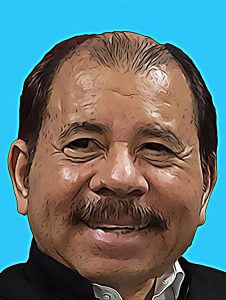Index relies entirely on the support of donors and readers to do its work.
Help us keep amplifying censored voices today.
 There is nothing more disappointing (or predictable) than a revolutionary hero turned tyrant. In the great tradition of Lenin and Castro, Ortega promised a new dawn as the leader of the rebel Sandinista National Liberation Front which opposed the Somoza family dictatorship in the late 1970s.
There is nothing more disappointing (or predictable) than a revolutionary hero turned tyrant. In the great tradition of Lenin and Castro, Ortega promised a new dawn as the leader of the rebel Sandinista National Liberation Front which opposed the Somoza family dictatorship in the late 1970s.
Ortega first took power in 1979 after the overthrow of the regime and served until 1990, first as the head of the Junta of National Reconstruction and then as President. After an absence of 17 years, he was re-elected in 2007 and has remained in office ever since. His rule has become increasingly brutal with crackdowns on his former political allies and opponents to his autocratic methods.
Protests against his regime began in 2014 over plans to grant a concession to a Chinese businessman to build the Nicaragua Canal. Protests were led by local campesinos whose faced the expropriation of their land. Further protests by indigenous people who blamed the government for forest fires flared in 2018 and compounded by opposition to tax increases and benefit reductions.
According to Human Rights Watch, Ortega has dismantled nearly all institutional checks on his presidential power. Opposition parties were banned in advance of the 2021 presidential elections and opponents imprisoned. Civil society has been neutered and an estimated 2,000 NGOs closed down with organisations receiving funding from international sources labelled as foreign agents. Over 100 journalists have been forced into exile in Costa Rica along with an estimated 80,000 asylum seekers.
In elections held in November 2022, the Sandinista Liberation Front announced it had won control of all 153 municipalities in the country. The result was inevitable after the banning of all opposition parties.
“For his critics, the Nicaraguan president has recreated a family dictatorship on the lines of the hated Somozas. His vice-president Rosario Murillo would disagree. She described the recent elections as ‘an exemplary, marvellous formidable day in which we confirm our calling for people.’ But then she is Ortega’s wife,” says Index’s editor-at-large Martin Bright.
On 23 July, popular Nicaraguan stand-up Luis Enrique Calderón has revealed that he was offered money by government officials in return for not ridiculing President Daniel Ortega in upcoming performances organised to celebrate the comedian’s 20 year career. The humorist, renowned for satirising famous personalities and politicians, contacted First Lady Rosario Murillo ahead of the event to gain their support for the act. Yet senior political advisor Fidel Moreno responded by offering to pay Calderón’s mortgage and give his children scholarships if he did not criticise the president or government. Calderón turned down the offer. However, since the rejection, he has received anonymous phone calls warning him that the July 29-30 concerts may yet be cancelled.
Channel 8, a critical TV station with the government, has been bought by a consortium created by presidents Daniel Ortega and Hugo Chávez. Details of the transaction had been kept secret, and Ortega’s possible control of the channel raised concern this week about attempts to silence the opposition.
Read more here
A week in which many are celebrating their love has turned the focus on those dissidents who are forced to be separate from their partners and families